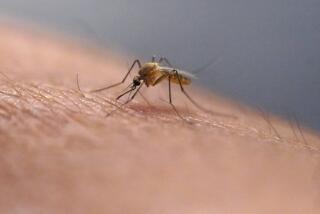Mosquito-repelling products may keep West Nile virus at bay
- Share via
Entomologists hesitate to predict how bad mosquitoes and other pests will be this season for travelers headed to national parks, the coasts or other areas where bugs can be plentiful. That’s because the proliferation of the pesky pests depends on rainfall and other factors.
But on one point most bug experts agree: This year, California may be a prime target for West Nile virus, a disease transmitted when mosquitoes that have fed on infected birds bite humans.
The first occurrence of West Nile virus in California was last year, and “the second year seems to have more intense activity,” says Roger Nasci, a research entomologist at the Centers for Disease Control and Prevention in Fort Collins, Colo. The virus usually causes a mild illness but can result in brain inflammation and be fatal.
About 80% of people don’t show any symptoms, but up to 20% have fever, headache, body aches, nausea and vomiting, according to the CDC. About one in 150 has more severe symptoms such as neck stiffness, stupor and convulsions.
Among those who develop the severe illness, the fatality rates vary from 3% to 15%.
Whatever your domestic destination this summer, you can get the upper hand with mosquitoes, ticks and other pests by using the proper repellents or knowing which home remedies work.
One of the newest options is clothing in which permethrin, insecticide that is available as a spray to be used on clothing, is bound to the fabric. The line of clothing, introduced in January, is called Buzz Off and includes hats, pants, shirts and other pieces, says Ryan Shadrin of Orvis, which distributes the clothing via the Internet (www.orvis.com) and its retail stores, including one in Pasadena.
The protection is said to last through about 25 washings.
Perhaps the best-known repellents are those made with DEET. They’re safe when used according to package directions, the CDC says. Although no definitive studies have been published about the concentration of DEET that is safe for children, the CDC says no serious illness has occurred from the proper use of DEET in formulas that are as much as 50% DEET, so those formulas are acceptable for adults and children older than 2 months.
Alternatives include repellents that have natural ingredients such as eucalyptus, citronella, mint and other substances.
“Most of the natural, botanical or herbal repellents typically provide repellency initially,” says John P. Smith of Florida’s Agricultural & Mechanical University in Tallahassee, “anywhere from 20 or 30 minutes, maybe an hour, and then the repellency falls apart. So you have to reapply constantly.”
Smith’s research team recently has found two natural repellents that rival the protection provided by the lower concentrations of DEET.
The natural alternatives include Repel’s lemon eucalyptus and Mosiguard, both of which have lemon and eucalyptus. Repel is sold in drugstores and camping supply stores. Mosiguard is sold over the Internet at www.mosi-guard.com.
Mary Louise Flint, an entomologist at UC Davis Extension, prefers Avon Skin So Soft as a natural repellent. “It works by protecting you with the oily film,” she says. “It’s fairly well documented that this will protect you as long as the oil is on the surface of your skin.”
To find out about the mosquito conditions and other pests at your destination, contact the state or local health departments at your destination (or go to their Web pages).
Healthy Traveler appears every other week. Kathleen Doheny can be reached at kathleendoheny@earthlink.net.






